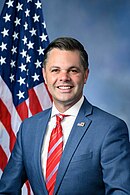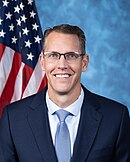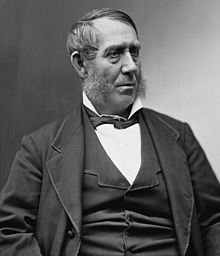Republican Party of Iowa
Republican Party of Iowa | |
|---|---|
Politics of Iowa |
The Republican Party of Iowa (RPI) is the affiliate of the
It is currently the dominant party in the state, controlling all but one statewide executive office, both of the state's U.S. Senate seats, all four of its U.S. House seats, and supermajorities in both chambers of the state legislature. Its main rival is the Iowa Democratic Party.
Officeholders
As of 2023, the Republican Party controls six of the seven statewide offices in Iowa and a majority in the
Members of Congress
U.S. Senate

U.S. House of Representatives
| District | Member | Photo |
|---|---|---|
| 1st | Mariannette Miller-Meeks |  |
| 2nd | Ashley Hinson |  |
| 3rd | Zach Nunn |  |
| 4th | Randy Feenstra |  |
Statewide offices
- Governor: Kim Reynolds
- Lieutenant Governor: Adam Gregg
- Secretary of State: Paul Pate
- Secretary of Agriculture: Mike Naig
- Attorney General of Iowa: Brenna Bird
- Treasurer of Iowa: Roby Smith
State Central Committee
The State Central Committee of the Republican Party of Iowa is composed of the National Committeeman and National Committeewoman, and representatives elected by the District Caucus from each congressional district.[2]
Executive officers
The Republican Party of Iowa's State Central Committee also consists of several executive officers, including chairman, Co-chairman, State Finance Chair, and State Co-Finance Chair. These executive members do not need to be seated members of the state central committee. These members also do not have a vote on standard proceedings. The State Chairman may vote only in the case of a tie or to create a tie during a meeting which he is presiding over.[2][3]
Committees
The Republican Party of Iowa is unique in that it has committees of the state party that can conduct local business. In particular, the party can have a Legislative Campaign Committee in each Congressional District with the purpose of helping Republicans win legislative races. In addition to the Legislative Campaign Committee there are several other standing committees of the Republican Party of Iowa they include: the Budget Committee, the Campaign Committee, the Organization Committee, and the Personnel Committee.[2]
County level
Each county in Iowa may form a County Central Committee. These committees include two members elected by each precinct in the county, though additional members may be elected based on the number of votes for Republican candidates in the previous general election from each precinct. Additionally, the county central committee elects a: Chairman, Co-chairman, Treasurer, and Secretary from either seated members of the county central committee or from Republicans within the county.[2]
Platform
The Republican Party of Iowa also develops an in-depth platform about what the state party stands for. In general this statement is a general document cementing the principle of the Republican Party while leaving some issues up to individual party voters.[4][5]
History

The RPI was founded on an
Pro-
The only Republican president from Iowa was Herbert Hoover (a native of West Branch) who was in office from 1929 to 1933.

Presidential selection
Straw poll
Since 1979, the RPI has held a straw poll in Iowa in each year preceding a presidential election, except when there is a Republican incumbent. This straw poll is separate from the Republican caucuses. The straw poll includes a dinner, multiple speeches by candidates, and a variety of booths set up by various candidates and causes, in addition to an actual straw poll of participants' presidential preferences.
Iowa Caucuses
The
In 2008 former Arkansas Governor Mike Huckabee grew in name recognition because of his Iowa victory and grew his national profile. In 2000 with a potentially heated nomination fight between then Texas Governor George W. Bush and Arizona Senator John McCain, Bush, who carried the state with 41% of the vote, set the tone for his campaign and set up a successful run for the Republican nomination and the presidency.[9]
During the
References
- ^ Winger, Richard. "March 2021 Ballot Access News Print Edition". Ballot Access News. Retrieved March 15, 2021.
- ^ a b c d "The Republican Party of Iowa". Iowagop.org. Retrieved November 8, 2011.
- ^ State Central Committee
- ^ "Republican Party of Iowa". Retrieved March 15, 2016.
- ^ Platform
- ISBN 0-312-29292-9.
- ^ Gue, Benjamin T. (1903). History of Iowa from the earliest times to the beginning of the twentieth century. The Century history company. p. 227.
- ^ Library of Congress. "NAACP Founder Charles Edward Russell". Library of Congress. Archived from the original on May 24, 2013.
- ^ "2000 Republican Primary Election Timeline". Uselectionatlas.org. Retrieved November 8, 2011.
- ^ Stephanie Condon (October 6, 2011). "Nevada the latest state to move up GOP primary calendar". CBS News. Retrieved December 14, 2011.

